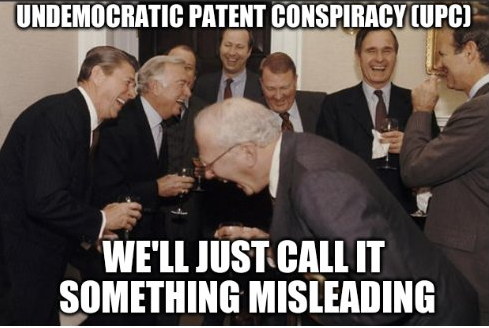

EARLIER this year we showed who was lobbying for the UPC inside the UK (not surprisingly, those who stand to benefit from litigation) and also showed some cognitive dissonance. Some want us to believe that the UPC will come to the UK irrespective of Brexit.
"Some want us to believe that the UPC will come to the UK irrespective of Brexit."The EPO may think that it's alright to promote software patents in Europe and to also promote the UPC (which helps bring them to every European country), but it won't be as easy as it hopes. It's certainly still an uncertainty whether or not UPC will ever become a reality at all.
In its first part, IP Kat alluded to matters of "user interface designs" patentability (related to software patents) and in this second part it focuses on "the German approach" rather than "the EPO approach" (the latter is less permissive). Another new article from IP Kat correctly points out that: "In the United States elements of software have traditionally been protected by patent law, copyright law and trade secret law."
"Generally speaking, every software developer (whether FOSS or proprietary) should be deeply concerned about efforts to pass more and more laws which purport to 'protect' but actually just criminalise more and more aspects of software development."Well, software is already protected from copying/plagiarism owing to copyright law. Patents should not at all be necessary and trade secret law is totally unnecessary for most purposes. It treats mere communication of ideas as "property". The article also says: "The overlapping protection provided by multiple disciplines of intellectual property over software is relatively routine. However, copyright preemption--federal copyright law essentially blocking an overlapping state claim--can sometimes preempt a trade secret claim covering software. To the extent there is lingering doubt about copyright preemption of trade secret claims covering software, federalizing a private cause of action for trade secret misappropriation through the Defend Trade Secrets Act likely removes any remaining doubt."
This basically speaks of proprietary software paradigms where there's presumption of code secrecy. Generally speaking, every software developer (whether FOSS or proprietary) should be deeply concerned about efforts to pass more and more laws which purport to 'protect' but actually just criminalise more and more aspects of software development. To whose benefit? ⬆